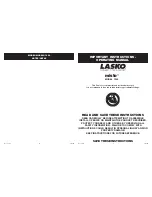
Principles of operation
4-3
Pressure rise time
The operator-set Rise Time defines the time required for inspiratory pressure to
rise to the set (target) pressure.
Negative pressures
There are no negative pressures generated during exhalation.
Oxygen concentration
The Respironics V60/V60 Plus Ventilator incorporates an oxygen mixer. Oxygen
concentration can be set in all modes.
Auto-Trak Sensitivity
An important characteristic of the Respironics V60/V60 Plus Ventilator is its
ability to recognize and compensate for intentional and unintentional leaks in
the system, and to automatically adjust its triggering and cycling algorithms to
maintain optimum performance in the presence of leaks. This is called Auto-
Trak Sensitivity. The following subsections describe this function in detail.
Triggering
Breaths are patient (flow) triggered in all modes, typically when patient effort
causes a certain volume of gas to accumulate above
baseline flow (volume
method). An inspiration is also triggered when the patient inspiratory
effort
distorts the expiratory flow waveform sufficiently (shape signal method; see
page 4-4).
Cycling
Cycling to exhalation occurs in these cases:
•
Patient expiratory
effort distorts the inspiratory flow waveform
sufficiently (shape signal method). See “Shape signal method of
cycling and triggering.” on page 4-4.
•
Patient flow reaches the spontaneous exhalation threshold (SET). See
“SET method of cycling.” on page 4-4.
•
After 3 seconds at the IPAP level (timed backup safety mechanism)
•
When a flow reversal occurs, typically due to a mask or mouth leak
Summary of Contents for Respironics V60
Page 1: ...Respironics V60 V60 Plus Ventilator User Manual ...
Page 2: ......
Page 8: ...viii ...
Page 28: ...2 10 Symbols ...
Page 44: ...3 16 General information ...
Page 60: ...4 16 Principles of operation ...
Page 74: ...5 14 Setting up the ventilator for use ...
Page 102: ...6 28 Operation ...
Page 110: ...7 8 High flow therapy ...
Page 114: ...8 4 Patient monitoring ...
Page 132: ...9 18 Alarms messages and troubleshooting ...
Page 142: ...10 10 Care and maintenance ...
Page 162: ...A 10 First time installation ...
Page 182: ...D 10 Regulatory compliance ...
Page 198: ...E 16 Diagnostic mode ...
Page 210: ...Index Index 6 ...
Page 211: ......
















































